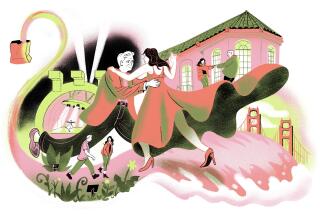Think you’ve got troubles? Consider the bad, the melancholy and the truly depressing
- Share via
My list of minor incidents that can ruin your day has inspired readers to suggest their own.
I got the idea, you may remember, from Miles Kington of the London Times, who wrote that he heard an Irishman in a pub make the following observation:
“There is nothing more melancholy than coming across an old photograph of a very pretty girl inscribed ‘Love from Monica’ and not remembering who Monica was.”
Harriet Ottaviano of Seal Beach suggests that the emotion produced by such trivial disasters may be depression , rather than melancholy.
“I have always associated melancholy with wistfulness, nostalgia, a sense of ‘you can’t go home again,’ ” she writes. “It passes through the mind, causes a faraway look in the eye, and life goes on. Sometimes melancholy can even be pleasant. Depression has no time factor and could never be termed pleasant. . . .”
In support of her point, she offers some examples of incidents that cause melancholy:
“Going back to a favorite watering hole of your college years and finding a Burger King in its place.
“Realizing you have nothing in common with anyone at your 20th high school reunion.
“Noticing how badly the colors have faded in your wedding pictures.”
Mrs. Ottaviano must have been married in the days when wedding pictures were in black and white, and were hand-tinted. I don’t believe today’s color prints fade.
Jacqueline Sewall-Blair of El Cajon offers two situations that depress her.
“You awaken in the morning in a broken water bed, then realize you don’t own a water bed.”
The possible explanations for that contretemps are too demoralizing to consider.
“You arrive at your office to find Mike Wallace sitting in your waiting room.”
Well, few of us are important enough, or have committed big enough sins, to attract the notice of Mike Wallace.
In any case, to give Mrs. Ottaviano her due, neither of those depressing situations would make one melancholy.
Frustrating , rather than depressing or melancholy , might be the best word for the incident described by Gene Gach.
“Finishing a long, tough trip someplace (like the tool shed through the snow) and, when you get there, finding you don’t have the thing you need to do it with (like the key to the tool shed); and then when you travel back finding it was in your pocket all the time.
“As for Monica, I will never forget her. She was the redhead I thought was succumbing to my personal charms in the Hotel Roosevelt bar until she asked me if I would buy her a pack of cigarettes because she didn’t want to break a fifty--her way of letting me know the costs of a closer acquaintance.”
I wouldn’t have taken it that way. I would have assumed that the young woman was letting me know that she could afford to buy dinner for the two of us. But I’m an optimist.
Jeanne S. Morgan recalls some “really bad things” from an ancient way of life in China, written by one Chang Chao:
“Moths in bookbags . . . Mosquitoes on summer nights . . . A leaky terrace . . . Dry chrysanthemum leaves . . . Big ants near pines . . . Too many fallen leaves of bamboo . . . Too quick wilting of lotus flowers . . . Snakes near creepers . . . Thorns on a trellis of flowers . . . Being poisoned from eating porcupines. . . .”
Ironically, Chang Chao’s list of “very bad things” seems to conjure up an almost idyllic rural life. If one’s day is ruined by such poetic phenomena as dry chrysanthemum leaves and wilting lotus leaves, it must be paradise.
I wonder what Chang Chao would have thought if he’d awakened in a broken water bed and then realized he didn’t even own a water bed?
On my own list was “Slamming your car door, hearing that conclusive thunk , and realizing that you have locked your keys inside.”
Barnaby Conrad, former bullfighter and author of the classic novel “Matador” (with his wife, Mary, he now conducts an annual spring writers conference in Santa Barbara), writes of doing even worse than that, with horrifying consequences:
“In 1947, as a young man of 25, I worked for Sinclair Lewis as his secretary for six months. He was one of the most famous writers in the world then; the richest, the most irascible; and though I revered him, I was scared to death of him.
“I remember one day I went down to the town (Williamstown, Mass.) to get him a book--he consumed a mystery every other day--and in the bookstore I met a charming girl named Ida. I whiled away so much time talking to her that I realized I’d be late for lunch, an unforgivable sin in the Lewis mansion.
“I dashed out of the store, jumped in the convertible sedan, and found the keys wouldn’t work. What a time for the ignition to jam! I let off the brake and coasted down the inclined street to the garage. As the men began to dismantle the ignition, one called, ‘Whose car is this, anyway?’
“ ‘Sinclair Lewis’,’ I replied.
“ ‘Mr. Lewis drives a Buick,’ the man replied.
“I had indeed got the wrong car. I ran back up the street and left word that if they saw a distraught person looking for a car it was in the garage, and sped off to face Mr. Lewis’ wrath.
“There’s a happy epilogue. I told Mr. Lewis about the girl. He said bring her to lunch; and he fell in love with her. They were close friends, though she refused to marry him, until his death in 1951. But unfortunately I liked her too--so he fired me.”
That’s a happy ending?


